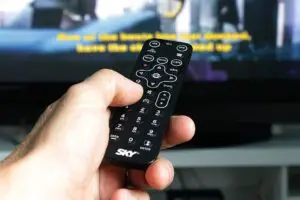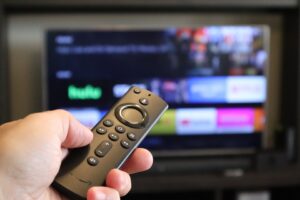In short, Samsung TVs typically have a lifespan ranging from 4 to 8 years based on usage patterns.
Samsung is renowned for crafting top-notch electronics, including TVs, and has earned a reputation for durability and excellence. This contributes to the perception that Samsung TVs are designed for prolonged use.
When considering a new TV purchase, it’s prudent to weigh the costs and benefits. The old adage “you get what you pay for” often holds true. Cheaper TVs might have a shorter lifespan compared to pricier alternatives.
Selecting the perfect TV can be challenging due to the plethora of brands and features available. Different manufacturers offer TVs with varying price points and quality levels, making it tricky to determine which brand produces long-lasting TVs.
If you’re seeking more insights, feel free to read on for further information.
How long do Samsung TVs last?
A Samsung TV typically has a lifespan of around 4 to 8 years.

This estimate is a general guideline and considers regular usage while assuming that the TV is properly cared for and not subjected to excessive strain.
Furthermore, the longevity might extend beyond this range if the TV is used infrequently or if the screen brightness isn’t set to its maximum during viewing. Adequate maintenance also plays a pivotal role in determining how long your Samsung TV will last.
In essence, using your Samsung TV with moderation and care could potentially extend its lifespan beyond the 8-year mark.
Are Samsung TVs really reliable?
Indeed, Samsung TVs are widely recognized for their reliability.
Samsung meticulously engineers their TVs for extended lifespans, even when used intermittently. The undeniable dependability and resilience of Samsung TVs are evident in their ability to endure for several years, even with regular usage.
These TVs are fashioned with durable components and undergo rigorous testing to ensure they deliver enduring performance. Samsung’s emphasis on crafting TVs capable of withstanding daily wear and tear, including vibrations and handling, contributes to their robust reputation.
As a result, Samsung occupies a prominent position in terms of reliability and product quality. Few brands can surpass Samsung when it comes to delivering a high standard of quality.
Aspects Affecting Lifespan of Samsung TV
The lifespan of a Samsung TV can be influenced by various usage patterns, including how often and for how long the TV is used, the type of content viewed, settings adjustments, and other factors. Here’s a summary of different aspects that can affect a Samsung TV’s lifespan:

Viewing Hours: Extended continuous usage can lead to more wear and tear, potentially shortening the TV’s lifespan.
Content Types: Certain content, like video games or news tickers with static images or high brightness levels, can contribute to screen burn-in on OLED TVs. Varying content and avoiding prolonged exposure to static images can help prevent this.
Settings Adjustments: Using extremely high settings or consistently pushing the TV to its maximum capabilities may strain components, affecting longevity. Optimal settings and avoiding excessive adjustments can help maintain the TV’s lifespan.
Power Cycling: Frequent on/off cycles can impact a TV’s lifespan. Limiting unnecessary power cycling helps preserve internal components.
Ambient Conditions: Dusty or humid environments can damage internal components and reduce lifespan. A clean, well-ventilated area minimizes dust accumulation and maintains optimal conditions.
Power Usage: Power fluctuations or inconsistent voltage levels can potentially damage components. Using stable power sources and surge protectors safeguards against power-related issues.
Remote Control Usage: Rough handling of the remote control may affect the TV’s lifespan. Gentle usage and care prevent undue strain.
Cleaning Frequency: Regular cleaning prevents dust buildup, enhancing performance and extending lifespan. Using proper cleaning methods and adhering to manufacturer guidelines ensures proper maintenance.
Gaming and Heavy Usage: Intensive tasks like gaming can strain components. Moderating such activities preserves longevity.
Parental Controls: Implementing controls for children prevents excessive strain or misuse, contributing to a longer lifespan.
Scheduled Breaks: Giving the TV breaks from continuous usage allows for heat dissipation and reduces strain, promoting longevity.
Proper Ventilation: Ensuring adequate ventilation is crucial. Blocked vents or confined spaces restrict airflow, causing heat buildup and potentially damaging components. Proper ventilation maintains optimal operating conditions.\
Power Surge Protection: Many Samsung TVs are equipped with built-in power surge protection. This feature serves as a safeguard against sudden voltage spikes and power surges that could potentially damage internal components and lead to a shorter lifespan for the TV.
Technological Advancements: The fast-paced progress in TV technology can also influence the lifespan of Samsung TVs. As new features and enhancements in picture quality emerge, consumers might opt to upgrade their TVs earlier than anticipated, even if their current TV is still in working condition. This trend of upgrading to newer models can contribute to a shorter overall lifespan for a TV.
These aspects collectively influence a Samsung TV’s lifespan. Adhering to good usage habits and proper maintenance practices can significantly extend the TV’s longevity.
How to Know it’s Time to Replace your Samsung TV?
Here are key indicators to consider when deciding whether to replace your Samsung TV:
- Poor Picture Quality: If you notice a decline in picture quality, such as a dim screen, less vibrant colors, and malfunctioning pixels, it might be time to replace your TV.
- Image Retention: If you see a persistent image retention or “ghosting” effect on the screen, especially after watching static images for extended periods, it could be a sign that the TV’s screen is aging.
- Faulty HDMI Ports: If the HDMI ports on your TV are not functioning properly, it can impact your ability to connect external devices and enjoy content.
- Screen Burn-In: OLED TVs, in particular, can be susceptible to screen burn-in, which occurs when static images are displayed for prolonged periods, leading to permanent image retention.
In general, consider replacing your Samsung TV if you experience a significant deterioration in screen brightness, clarity, and color vibrancy that occurs over several years of use.

The lifespan of a Samsung TV can also be influenced by technological advancements. As newer TV models with improved features and picture quality are introduced, some consumers may opt to upgrade their TVs before the natural end of their TV’s lifespan to take advantage of these advancements.
Tips to Extend the lifespan of your Samsung TV
To extend the lifespan of your Samsung TV or any TV, consider the following tips:
- Optimal Brightness and Contrast: Adjust the TV’s brightness and contrast settings to levels that are comfortable for viewing while avoiding excessively high settings that could strain the screen and components.
- Regular Cleaning: Clean the TV screen and exterior regularly using appropriate methods and cleaning solutions to prevent dust buildup that could impact performance.
- Power Management: Turn off the TV when not in use to minimize wear on internal components and reduce power consumption.
- Voltage Regulation: Use a voltage regulator or surge protector to protect the TV from sudden voltage fluctuations and power surges that could potentially damage internal circuits.
- Proper Ventilation: Ensure the room where the TV is placed has good ventilation and is not exposed to extreme temperatures or high humidity, as these conditions can impact the TV’s internal components.
- Recommended Environmental Conditions: Operate the TV within the manufacturer’s recommended environmental conditions, which usually include a specific temperature range and humidity level. Avoid exposing the TV to direct sunlight, which can cause overheating and damage.
By following these guidelines, you can help prolong the lifespan of your Samsung TV and maintain its optimal performance over time.
OLED TV Screen Burn-in
OLED TVs, including certain Samsung models, are susceptible to screen burn-in, which is the result of prolonged display of static images leading to permanent damage on the screen. Samsung, among other manufacturers, has taken steps to mitigate this risk and enhance the durability of their OLED TVs.

To further support their customers, Samsung provides warranties for their TVs. These warranties offer coverage for a specified period of time and can encompass repair or replacement services in case any issues emerge within that timeframe. The warranty coverage can serve as a safety net, safeguarding against manufacturing defects that might impact the TV’s lifespan and performance.
In conclusion, while OLED TVs, including Samsung’s offerings, can be susceptible to specific issues like screen burn-in, the manufacturer’s implementation of technologies and warranty support aims to enhance the overall longevity and reliability of their products.
Wrapping it up
Samsung TVs are renowned for their reliability and extended lifespan. While the average duration of a Samsung TV’s functional life is typically between 4 to 8 years, various factors can impact its longevity. Elements like usage habits, maintenance routines, environmental conditions, and technological advancements all contribute to determining how long a Samsung TV will remain operational.
By adhering to appropriate usage practices, such as managing viewing hours, avoiding prolonged exposure to static images, and utilizing recommended settings, users can contribute to prolonging the lifespan of their Samsung TVs. Consistent maintenance activities, including regular cleaning and ensuring proper ventilation, also contribute to optimal performance and durability.
Samsung’s dedication to quality is evident through features like built-in power surge protection and regular software updates, both of which bolster the TV’s resilience and adaptability to evolving technologies. Furthermore, Samsung’s implementation of strategies to mitigate the risk of screen burn-in on OLED models showcases their commitment to enhancing the TV’s longevity.
In summary, Samsung TVs stand out for their reliability and extended lifespan, and by following appropriate usage patterns, maintenance practices, and benefiting from the manufacturer’s technology and safeguards, users can maximize the lifespan of their Samsung TVs.
You May Also Enjoy Reading: How to Find the Perfect Samsung TV Size?
FAQs
Can software updates influence the lifespan of a Samsung TV? Software updates released by Samsung can enhance the performance, compatibility, and security of their TVs. While software updates themselves may not directly impact the lifespan of the TV, they can help ensure the TV remains up-to-date and capable of handling new technologies, potentially extending its usability.
What are the disadvantages of a Samsung smart TV? One notable disadvantage of Samsung smart TVs is the potential security risk. The primary concern is the possibility of hackers gaining unauthorized access to your TV, particularly if there are vulnerabilities in the manufacturer’s encryption. To mitigate this risk, it’s advisable not to use your Samsung smart TV for sensitive activities such as sharing bank information, addresses, or passwords. Additionally, employing strong and secure passwords can help enhance the security of your TV.
What is better, LG or Samsung TV? Both LG and Samsung are renowned brands that offer excellent TVs. If you’re interested in QLED TVs, Samsung’s QLED models are recognized for their impressive picture quality. On the other hand, if you prioritize a wider viewing angle and better contrast ratio, LG’s OLED TVs are a strong choice.
When it comes to screen quality, deciding between LG and Samsung can be challenging, as both brands are capable of delivering exceptional viewing experiences. Ultimately, your choice between the two will likely depend on your personal preferences and the specific features you value most.
In either case, you can expect to enjoy an outstanding viewing experience, regardless of whether you choose LG or Samsung.

